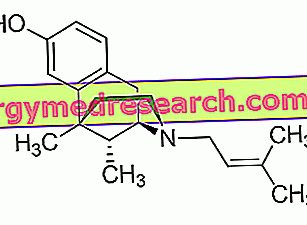Generality
Pentazocine is a drug belonging to the class of opioid analgesics. However, its pain-relieving power is lower than that of morphine; in fact, indicatively, pentazocine possesses a sixth of the analgesic potency of morphine.

Pentazocine - Chemical structure
Pentazocine is available for parenteral administration, which is mainly used in the treatment of pain of moderate intensity.
Examples of medicinal specialties containing Pentazocine
- Talwin ®
Indications
For what it uses
The use of pentazocine is indicated for the treatment of moderate to severe pain. Furthermore, the drug can also be used in pre-operative treatment or as a supportive therapy for general anesthesia before surgery.
Warnings
Since pentazocine can cause respiratory depression, its use in patients suffering from asthmatic diseases or from obstruction of the respiratory tract must be carried out with extreme caution.
Pentazocine should be used with caution even in the following cases:
- In patients with renal and / or hepatic impairment, as there may be an increased risk of occurrence of side effects;
- In patients who have to undergo biliary tract surgeries, because the drug can cause spasm of Oddi's sphincter;
- In patients with acute myocardial infarction, as pentazocine may increase pulmonary artery pressure and peripheral vascular resistance;
- In epileptic patients, since pentazocine could favor the onset of convulsions.
Pentazocine can cause physical and mental dependence, especially when used for long periods of time. Therefore, adequate precautions should be taken to avoid its occurrence.
Since there are insufficient data on the safe use of pentazocine in children under 12 years of age, the use of the drug in this category of patients is not recommended.
Pentazocine can cause various side effects that can alter the ability to drive and / or use machinery, so great care should be taken.
Finally, for those who perform sports, the use of pentazocine without therapeutic necessity is doping and in any case can determine positivity to doping tests even when taken for therapeutic purposes.
Interactions
Pentazocine is a weak μ opioid receptor antagonist and, as such, plays an antagonistic action against substances such as methadone (an opioid receptor agonist μ used in drug addiction substitution therapy).
If pentazocine is administered to patients treated with methadone, withdrawal symptoms may occur due to the antagonistic effect of pentazocine itself.
Concomitant administration of pentazocine and other drugs depressing the central nervous system may increase depression centrally. This effect can be exploited in anesthesia.
However, before starting treatment with pentazocine, it is always a good idea to tell your doctor if you are taking - or have recently been taken - drugs of any kind, including non-prescription medicines and herbal and homeopathic products.
Side effects
Pentazocine can cause several types of side effects, although not all patients experience them. This depends on the different sensitivity that each individual has towards the drug, therefore, it is not said that the adverse effects occur all with the same intensity in each person.
The following are the main side effects that may occur during treatment with pentazocine.
Gastrointestinal disorders
Pentazocine therapy can cause nausea, vomiting, constipation and dry mouth.
Nervous system disorders
Treatment with pentazocine may cause dizziness or a feeling of emptiness, headache and sedation.
Psychiatric disorders
Pentazocine therapy can cause euphoria, insomnia, hallucinations, confusion and mood changes.
Skin and subcutaneous tissue disorders
Following parenteral administration of pentazocine, the following may occur:
- Reactions at the injection site;
- Ulceration and scaling of the skin;
- Pain at the time of injection;
- Skin redness;
- Dermatitis;
- Itch.
Lung and respiratory tract disorders
Respiratory depression and dyspnoea may occur during pentazocine therapy.
Cardiovascular disorders
Treatment with pentazocine may cause:
- Circulatory depression;
- Hypotension;
- Shock.
Other side effects
Other side effects that could occur during pentazocine therapy are:
- Physical and psychic dependence;
- Tinnitus;
- Blurred vision;
- Urinary retention;
- Tachycardia;
- Weakness or fainting;
- Allergic reactions in sensitive individuals.
Overdose
In the event of excessive doses of pentazocine, the antidote is naloxone given intravenously. In addition, all supportive treatments must be initiated.
In any case, if a pentazocine overdose is suspected, it is necessary to inform the doctor immediately and go to the nearest hospital.
Action mechanism
Pentazocine has an analgesic action because it is an κ-opioid receptor agonist. These receptors are arranged along the pain pathways present within the body and have the task of modulating, precisely, the neurotransmission of the painful stimulus. When these receptors are stimulated, a cascade of chemical signals is activated which eventually leads to the induction of analgesia.
Therefore, pentazocine is able to activate the aforementioned receptors, thus exerting a pain-relieving effect.
Mode of Use - Posology
As mentioned, pentazocine is available for parenteral administration as an injectable solution.
The dose of pentazocine usually used in adults is 30 mg, to be administered intramuscularly, subcutaneously or intravenously. Administration, if necessary, can be repeated every 3-4 hours. In any case, the maximum daily dose of 360 mg of drug should never be exceeded.
Elderly patients may need a reduction in the dosage of pentazocine usually administered.
Pregnancy and breastfeeding
Pentazocine should be used by pregnant women only if the doctor considers it absolutely necessary and only after a careful evaluation of the relationship between the potential benefits expected for the mother and the potential risks to the fetus.
The effects of pentazocine in newborns whose mothers are taking the drug are not known.
For the above reasons, pregnant women and breastfeeding mothers must inform and seek medical advice before starting pentazocine therapy.
Contraindications
The use of pentazocine is contraindicated in patients with known hypersensitivity to pentazocine itself and in patients with known hypersensitivity to other drugs with a chemical structure similar to that of pentazocine.



